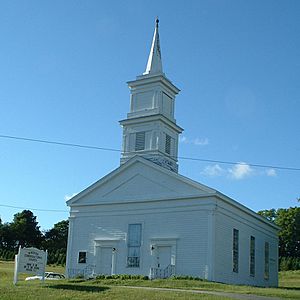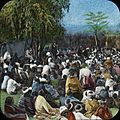Congregational church facts for kids
Congregationalism is a way that some Christian churches, especially Protestant ones, are organized. It means that each local church or community makes its own decisions. They are independent and don't have a central leader or group telling them what to do.
Contents
Understanding Congregational Churches
How Congregational Churches Work
In a Congregational church, the members of that specific church have the power to make important decisions. This includes choosing their leaders, deciding on their beliefs, and managing their own money. It's like each church is its own small, self-governing community. Many Anabaptist, baptist, and pentecostal churches use this style of organization.
Different Ways Churches Are Organized
Congregationalism is different from other ways churches are set up.
- Presbyterianism: In this system, a group of elders (experienced leaders) from different churches govern the churches together. It's more like a network of churches sharing decisions.
- Episcopalism: Here, a number of bishops (senior religious leaders) oversee many churches in a larger area. They have more authority over the individual churches.
A Brief History of Congregationalism
Congregationalism started a long time ago, in the 16th and 17th centuries. It grew out of the Anglican church in England. People who wanted churches to be organized this way were often called Puritans. They were inspired by some of the teachings of reformers like Jean Calvin and Huldrych Zwingli. They believed that each local church should have more control over its own affairs.
Images for kids
-
North Congregational Church in Farmington Hills, Michigan, United States.
-
A Catalogue of the Several Sects and Opinions in England and other Nations: With a briefe Rehearsall of their false and dangerous Tenents, propaganda broadsheet denouncing English Dissenters from 1647.
-
The London Missionary Society preaching to native peoples of Oceania
-
A Congregational church in Middlebury, Vermont
See also
 In Spanish: Iglesia congregacional para niños
In Spanish: Iglesia congregacional para niños
 | Percy Lavon Julian |
 | Katherine Johnson |
 | George Washington Carver |
 | Annie Easley |








